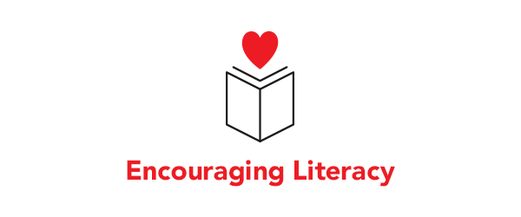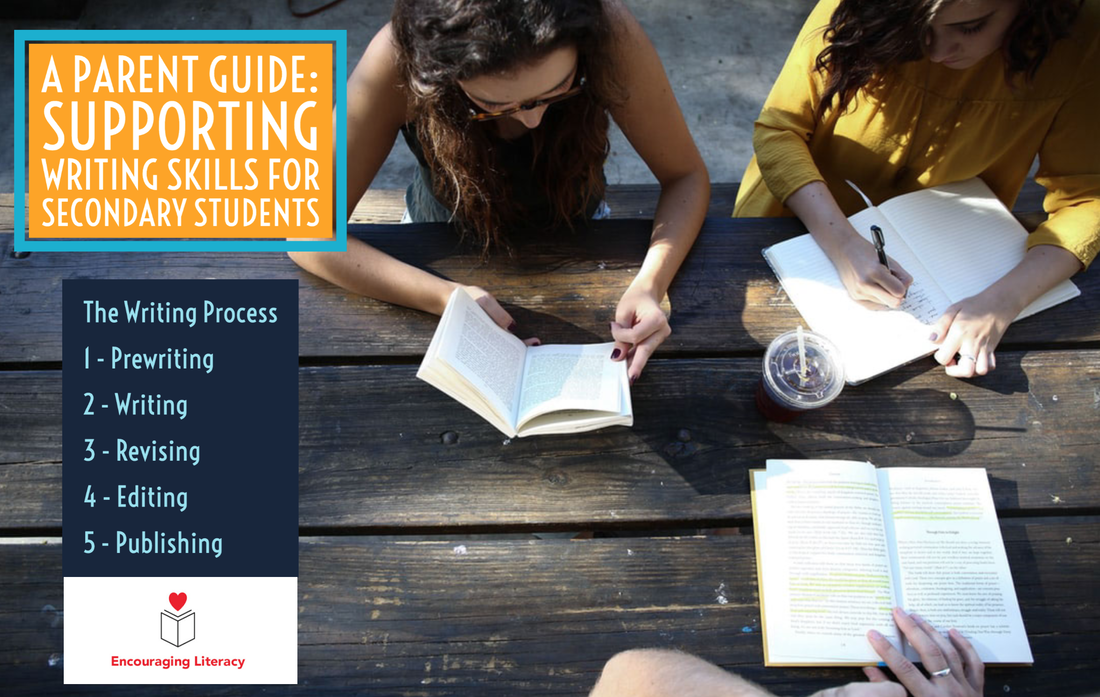Parent Guide:
Supporting Writing Skills for Secondary Students
What You Need To Know
Middle School and High School students should not be a stranger to writing assignments by now! However, there are still a few tricky areas in which parents could lend support and guidance. Here are some potential difficulties a maturing writer may still face:
Ideas and content may still be a struggle for teens. If they have a hard time coming up with subject matter for their writing, parents could support their teen by talking with their child about the topic. (Read the benefits of talking to your child as a way to support writing development in my previous post here.) It could be that your child needs to gather more knowledge about a topic, clarify information, or just talk through their ideas. As your child talks, parents could listen and record ideas so your child has something to refer to when they need to return back to work on the assignment. Some kids process information visually so using a graphic organizer to collect information would be helpful for them.
Another tricky area for teens is making sure their ideas are organized. Use of a graphic organizer, story planner, or essay outline would be helpful. (An online search will yield tons of resources you can download!) Each paragraph should center around one main idea. Details should add to their point and not be a distraction.
If writing an academic essay, it is critical for teens to be able to prove their claims. When your child makes a statement in their paper, they should offer a quote with details from the text or cite an expert to provide evidence that supports their claim. Basically, students need proof within their essay that someone agrees with them and they are correct.
The Writing Process
1. Prewriting – A writer explores possible topics, collects details about the topic, and plans how to use them in writing.
2. Writing – During this step, a writer completes a first draft using the plan as a guide.
3. Revising – A writer changes any ideas that are not clear or complete, and may ask at least one other person to review the draft.
4. Editing – A writer then checks and proofreads his or her revised writing for correctness before preparing a neat final copy.
5. Publishing – This is the final step in the writing process. Publishing is an opportunity to share what was written with others.
Middle School and High School students should not be a stranger to writing assignments by now! However, there are still a few tricky areas in which parents could lend support and guidance. Here are some potential difficulties a maturing writer may still face:
Ideas and content may still be a struggle for teens. If they have a hard time coming up with subject matter for their writing, parents could support their teen by talking with their child about the topic. (Read the benefits of talking to your child as a way to support writing development in my previous post here.) It could be that your child needs to gather more knowledge about a topic, clarify information, or just talk through their ideas. As your child talks, parents could listen and record ideas so your child has something to refer to when they need to return back to work on the assignment. Some kids process information visually so using a graphic organizer to collect information would be helpful for them.
Another tricky area for teens is making sure their ideas are organized. Use of a graphic organizer, story planner, or essay outline would be helpful. (An online search will yield tons of resources you can download!) Each paragraph should center around one main idea. Details should add to their point and not be a distraction.
If writing an academic essay, it is critical for teens to be able to prove their claims. When your child makes a statement in their paper, they should offer a quote with details from the text or cite an expert to provide evidence that supports their claim. Basically, students need proof within their essay that someone agrees with them and they are correct.
The Writing Process
1. Prewriting – A writer explores possible topics, collects details about the topic, and plans how to use them in writing.
2. Writing – During this step, a writer completes a first draft using the plan as a guide.
3. Revising – A writer changes any ideas that are not clear or complete, and may ask at least one other person to review the draft.
4. Editing – A writer then checks and proofreads his or her revised writing for correctness before preparing a neat final copy.
5. Publishing – This is the final step in the writing process. Publishing is an opportunity to share what was written with others.
Conversation Starters
Many adults are intimidated by writing, so keep this in mind - You are not their teacher, you are not the grammar police, you are not a published author…Ok…Ok…maybe you are. Let’s say you are an educator, an editor, a journalist, a technical writer, or marketing communication specialist. Regardless of your professional background, the point is to break down barriers for writing and inspire kids to keep writing.
Parent Tip-
As a parent, the key to supporting an adolescent’s writing development is to guide and encourage. Help by giving them pointers in the right direction and validate their efforts. Start with the positive and build their confidence!
To guide and encourage writing
To offer constructive feedback
Back to ***COVID-19: Supporting Literacy Development at Home***
Many adults are intimidated by writing, so keep this in mind - You are not their teacher, you are not the grammar police, you are not a published author…Ok…Ok…maybe you are. Let’s say you are an educator, an editor, a journalist, a technical writer, or marketing communication specialist. Regardless of your professional background, the point is to break down barriers for writing and inspire kids to keep writing.
Parent Tip-
As a parent, the key to supporting an adolescent’s writing development is to guide and encourage. Help by giving them pointers in the right direction and validate their efforts. Start with the positive and build their confidence!
To guide and encourage writing
- I really like how you…(organized your writing, chose precise and meaningful words, eloquently shared your feelings, described that moment so poignantly, etc.).
- Which part of this writing are you the most proud of?
- What are some challenges you had while writing?
- What have you done to overcome those writing issues?
- I’m so proud of you. I can see that you’ve made tremendous improvement in these areas…(name the areas of improvement).
To offer constructive feedback
- Would you like me to suggest some strategies you can try?
- What can I do to continue supporting you?
- Which areas of your writing would you like some feedback?
- Let me read this section out loud to you. Have I interpreted your tone and voice correctly?
- Can you clarify your point here? I’m not sure I understand what you mean.
Back to ***COVID-19: Supporting Literacy Development at Home***
Services |
Company |
© COPYRIGHT 2015. ALL RIGHTS RESERVED.
|

